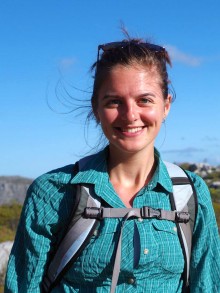Unwanted travelers
Elizabeth Bouchard ’16 reveals how tourists unwittingly aid in the spread of non-native plant species in an article she co-authored in the October 2015 issue of Koedoe, a peer-reviewed journal focusing on biodiversity science and conservation in Africa.
Bouchard, an environmental science major who is also minoring in public policy, got involved in this research while studying abroad last spring with the Organization for Tropical Studies (OTS) in South Africa.

“I chose to work with Dr. Kristi Maciejewski, investigating the role tourists play in the dispersal of non-native seeds into fynbos protected areas, an ecosystem unique to the Western Cape,” Bouchard said. “Currently, there is limited scientific research regarding seed dispersal by human activities, and only one previous study on seed dispersal by tourists has been conducted in Africa. Since our results were intriguing and novel, we decided to publish our paper.”
Bouchard designed the study and performed fieldwork with Maciejewski and four other OTS students. The study involved using long-bristle brushes to scrape seeds off visitors’ shoes and off bicycle wheels and dogs that were being walked in the Silvermine Nature Reserve in South Africa. In addition, the group surveyed vegetation in the park, identifying the alien plant species that raised the greatest concern.
They found that many of these species were located along dog paths and that dog walkers were more likely to have seeds on their shoes than hikers and cyclists.
Bouchard said she is pleased that her work will have real, immediate applications.
“The data I collected will help inform management decisions of invasive species in South Africa’s protected areas, preventing the introduction and spread of non-native species,” she said.
The Cumberland, Maine, native, who will graduate this spring, hopes to use her skills as a scientist to bridge the information gap between scientists, policymakers and the public.
“My ideal career will enable me to inspire change that will help to protect and preserve the environment through scientific knowledge, public policy development and education,” she said.
